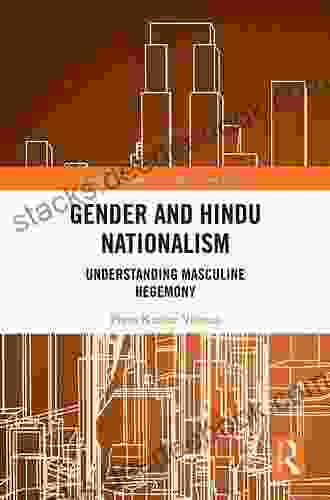Understanding Masculine Hegemony: A Comprehensive Analysis | Routledge Studies in South Asian Politics 20

5 out of 5
| Language | : | English |
| File size | : | 2861 KB |
| Text-to-Speech | : | Enabled |
| Screen Reader | : | Supported |
| Enhanced typesetting | : | Enabled |
| Word Wise | : | Enabled |
| Print length | : | 229 pages |
In the tapestry of human societies, gender has long been a defining thread, shaping power dynamics, social norms, and individual experiences. One of the most pervasive and influential concepts in gender studies is that of masculine hegemony. This complex and multifaceted phenomenon refers to the way in which masculinity is socially constructed as the dominant and normative form of gender, resulting in the subordination of femininity and other marginalized gender identities.
Routledge Studies in South Asian Politics 20, a seminal work in the field of gender studies, delves deeply into the concept of masculine hegemony, providing a comprehensive analysis of its manifestations, effects, and challenges in contemporary society. This article aims to synthesize key insights from this volume, offering a nuanced understanding of this critical issue.
The Social Construction of Masculinity
At the heart of masculine hegemony lies the social construction of masculinity itself. Masculinity is not an innate or biological trait, but rather a set of behaviors, attitudes, and expectations that are learned and reinforced through socialization processes. These processes begin in early childhood, with parents, peers, and media messages shaping children's understanding of what it means to be "masculine." Male children are encouraged to be strong, assertive, and competitive, while female children are often socialized to be more passive, nurturing, and cooperative.
The social construction of masculinity is deeply embedded in cultural norms and values. In many societies, masculinity is associated with power, status, and privilege, while femininity is often seen as inferior or lacking. This creates a hierarchy of gender, with men occupying the dominant position and women being relegated to subordinate roles.
Manifestations of Masculine Hegemony
Masculine hegemony manifests itself in a myriad of ways, both overt and covert. In the public sphere, men dominate positions of power and influence, from politics and business to academia and media. They are more likely to be seen as leaders, experts, and authorities, while women are often relegated to supporting roles or marginalized altogether.
In the private sphere, masculine hegemony perpetuates gender inequality within families and intimate relationships. Men are often expected to be the primary breadwinners and decision-makers, while women are responsible for domestic labor and childcare. This division of labor reinforces traditional gender roles and limits women's opportunities for personal and professional growth.
Violence is another insidious manifestation of masculine hegemony. Men are far more likely to commit acts of violence against women than women are to commit acts of violence against men. This violence can take many forms, including physical abuse, sexual assault, and psychological coercion.
Effects of Masculine Hegemony
The effects of masculine hegemony are far-reaching and detrimental to both men and women. For men, it can lead to feelings of pressure to conform to unrealistic expectations of masculinity, resulting in mental health issues such as depression and anxiety. It can also lead to violence and aggression, as men may feel the need to prove their masculinity through physical force.
For women, masculine hegemony creates a constant threat of violence and discrimination. It limits their access to education, employment, and healthcare, and it can lead to social isolation and economic hardship. Additionally, masculine hegemony can perpetuate harmful stereotypes about women, reinforcing the idea that they are inferior to men.
Challenging Masculine Hegemony
Challenging masculine hegemony is a complex task that requires a multifaceted approach. One important step is to raise awareness about the concept and its effects. By educating ourselves and others about gender inequality, we can begin to dismantle the social norms that perpetuate it.
It is also crucial to challenge traditional gender roles and stereotypes. We need to create spaces where men and women can express themselves freely and authentically, without fear of judgment or discrimination. We need to promote gender equality in all spheres of life, from the family to the workplace to the political arena.
Finally, it is important to support men and boys who are working to challenge masculine hegemony. These individuals are often marginalized and silenced, but they play a vital role in creating a more just and equitable society. We need to create spaces where they can feel safe to share their experiences and work together to create change.
Masculine hegemony is a complex and pervasive phenomenon that shapes gender relations in profound ways. By understanding its social construction, manifestations, effects, and challenges, we can begin to dismantle it and create a more just and equitable society for all.
Routledge Studies in South Asian Politics 20 provides a valuable resource for anyone interested in understanding masculine hegemony and its impact on South Asian societies. This volume offers a comprehensive analysis of the issue, drawing on a range of theoretical and empirical perspectives. It is a must-read for scholars, policymakers, and activists working to challenge gender inequality and promote social justice.
References
- Connell, R. W. (2005). Masculinities. Cambridge: Polity Press.
- Kimmel, M. S. (2013). Angry white men: American masculinity at the end of an era. New York: Nation Books.
- Routledge Studies in South Asian Politics 20. (2023). Masculine Hegemony in South Asia: Rethinking Power, Gender, and Agency. Routledge.
5 out of 5
| Language | : | English |
| File size | : | 2861 KB |
| Text-to-Speech | : | Enabled |
| Screen Reader | : | Supported |
| Enhanced typesetting | : | Enabled |
| Word Wise | : | Enabled |
| Print length | : | 229 pages |
Do you want to contribute by writing guest posts on this blog?
Please contact us and send us a resume of previous articles that you have written.
 Book
Book Novel
Novel Page
Page Chapter
Chapter Text
Text Genre
Genre Reader
Reader Library
Library Paperback
Paperback E-book
E-book Paragraph
Paragraph Shelf
Shelf Foreword
Foreword Preface
Preface Synopsis
Synopsis Annotation
Annotation Footnote
Footnote Manuscript
Manuscript Scroll
Scroll Codex
Codex Bestseller
Bestseller Narrative
Narrative Reference
Reference Encyclopedia
Encyclopedia Dictionary
Dictionary Thesaurus
Thesaurus Narrator
Narrator Stacks
Stacks Research
Research Scholarly
Scholarly Lending
Lending Reading Room
Reading Room Rare Books
Rare Books Interlibrary
Interlibrary Literacy
Literacy Thesis
Thesis Dissertation
Dissertation Awards
Awards Reading List
Reading List Textbooks
Textbooks Brittni Vega
Brittni Vega Morgan Rice
Morgan Rice Pandit Rajmani Tigunait Ph D
Pandit Rajmani Tigunait Ph D Percy Bysshe Shelley
Percy Bysshe Shelley Nichelle Williams Isiah
Nichelle Williams Isiah Estela Raileanu
Estela Raileanu Emery Leeann
Emery Leeann Christopher Hauke
Christopher Hauke Lara Casanova
Lara Casanova Andy Schneider
Andy Schneider Jim Mackie
Jim Mackie David Halle
David Halle Adriana Locke
Adriana Locke Michael Kimmage
Michael Kimmage Adrian Streather
Adrian Streather Trish Milburn
Trish Milburn Sam Mahon
Sam Mahon Mike Austin
Mike Austin Dennis Kelsall
Dennis Kelsall Paul Polak
Paul Polak
Light bulbAdvertise smarter! Our strategic ad space ensures maximum exposure. Reserve your spot today!

 Anton FosterMy Angels Wear Fur: A Journey of Faith, Family, and the Unconditional Love of...
Anton FosterMy Angels Wear Fur: A Journey of Faith, Family, and the Unconditional Love of... Isaias BlairFollow ·18.2k
Isaias BlairFollow ·18.2k Gus HayesFollow ·13.5k
Gus HayesFollow ·13.5k Jonathan HayesFollow ·10.3k
Jonathan HayesFollow ·10.3k W. Somerset MaughamFollow ·18.6k
W. Somerset MaughamFollow ·18.6k Jean BlairFollow ·3.8k
Jean BlairFollow ·3.8k Jedidiah HayesFollow ·18.1k
Jedidiah HayesFollow ·18.1k Jaylen MitchellFollow ·8.6k
Jaylen MitchellFollow ·8.6k Walt WhitmanFollow ·14.9k
Walt WhitmanFollow ·14.9k

 Amir Simmons
Amir SimmonsMore Zeal Than Discretion: A Closer Look at the Risks and...
Enthusiasm is often seen as a positive...

 Wayne Carter
Wayne CarterYear of the Dog: American Poets Continuum 178
Year of the Dog is a...

 David Foster Wallace
David Foster WallaceThe Constitution of the State of New York: A...
The Constitution of the...

 Harvey Bell
Harvey BellSmall Cetaceans of Japan: Exploitation and Biology
Small cetaceans, including...

 Blake Bell
Blake BellEffortless Elegance: A Comprehensive Guide to Captivating...
In the realm of crocheting,...
5 out of 5
| Language | : | English |
| File size | : | 2861 KB |
| Text-to-Speech | : | Enabled |
| Screen Reader | : | Supported |
| Enhanced typesetting | : | Enabled |
| Word Wise | : | Enabled |
| Print length | : | 229 pages |












